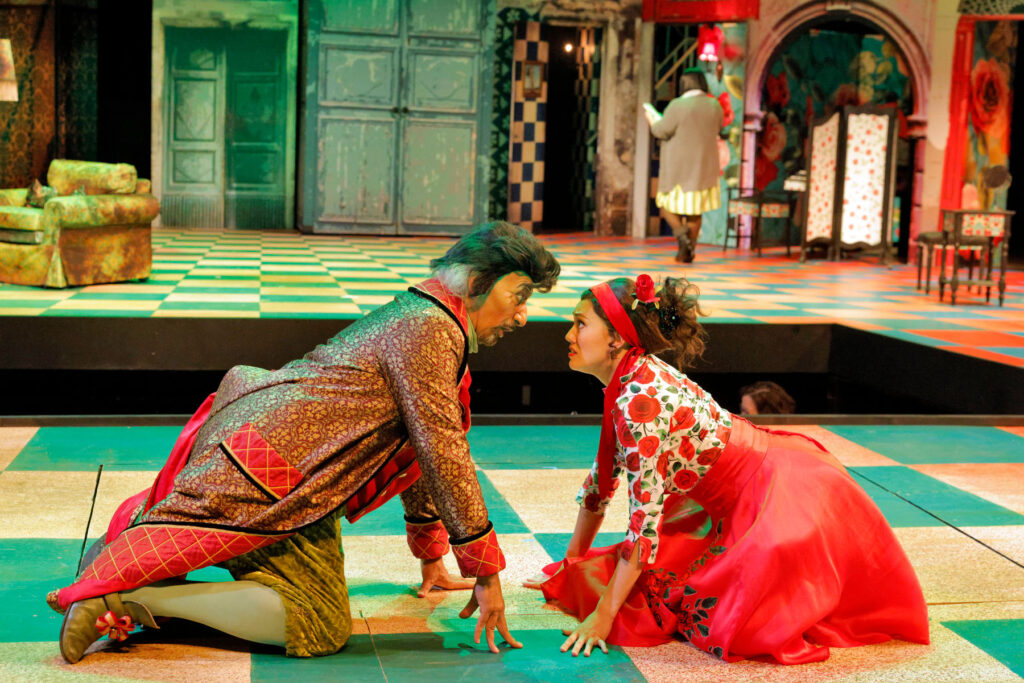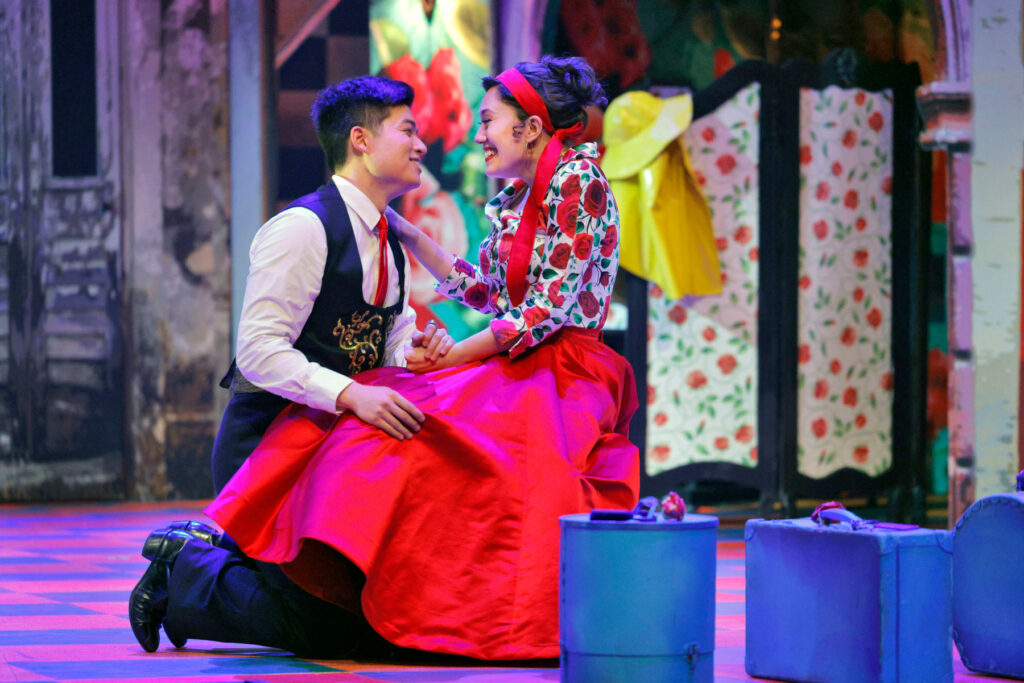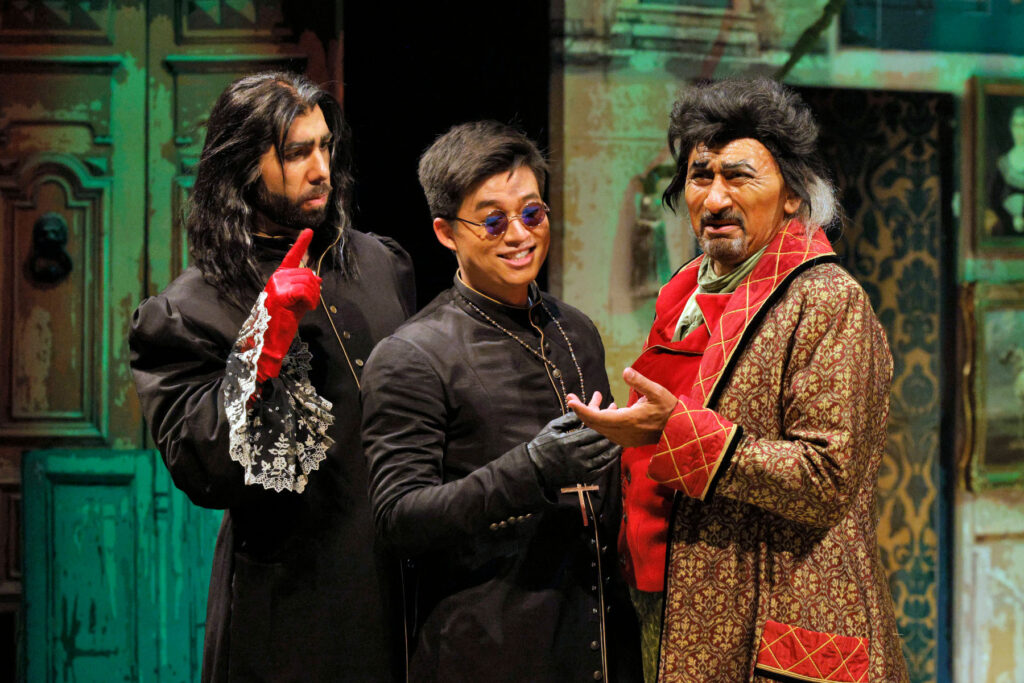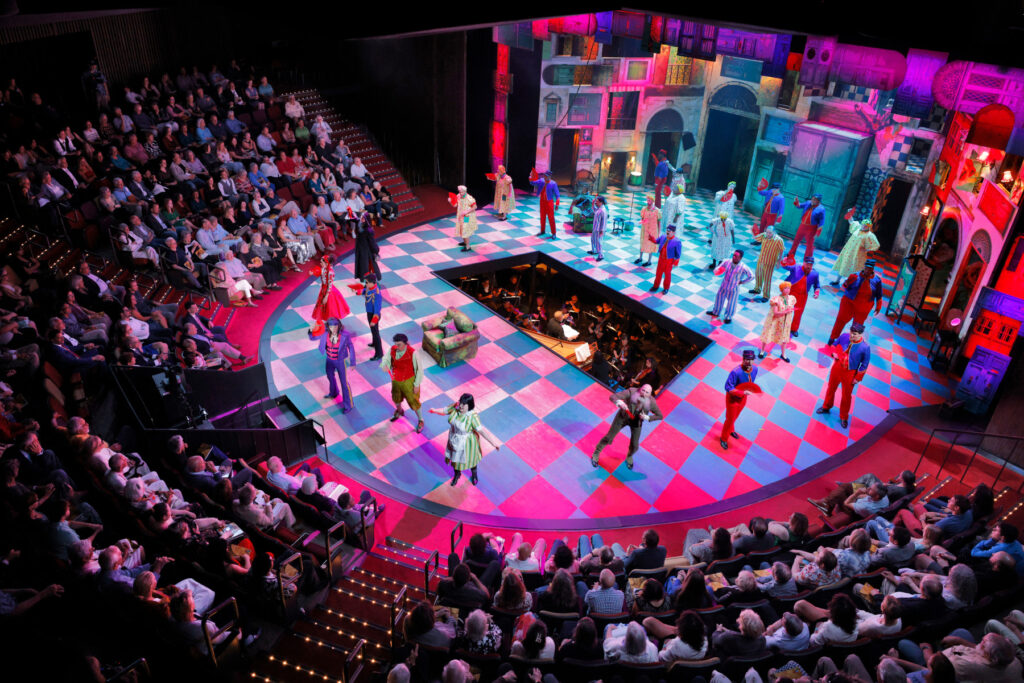From the dancing light show during the sprightly overture to the closing precision of the flamenco-disco ensemble moves and every moment in between, Des Moines Metro Opera’s The Barber of Seville was an unending cascade of fresh comic invention.
Add in the fact that it was also musically impeccable, and you have the recipe for the headline. It is not easy to make me laugh, familiar as I am with one of the most frequently performed operatic comedies in the canon, but my chuckle gauge was on overload much of the performance.

Since this staging was a co-production with Opera Queensland, New Zealand Opera, and Seattle Opera, where it has been previously performed, the production has had time to marinade and mature. The trick to making such a well-known comedy new again is to surprise us, and that it did at nearly every turn.
Production Designer Tracy Grant Lord has unleashed a kaleidoscope of colors, starting with the set. In a program note, it was explained that a farce needs doors, and the arching structure had oodles of them in addition to enough windows, on so many levels they created the effect of an out of control Advent calendar on acid. They opened, they slammed, they stood ajar, characters went out one place and returned from another.
The red and blue diamond pattern on the floor had the pleasantly busy effect of Op art.
The lighting was also joyously colorful, and playfully intricate. I couldn’t possibly count the number of isolated specials there were, but as they were deployed with such frequency, I couldn’t help but feel they, too, were calculated to help advance the dizzying pace of the show. And the costumes! The flamboyant florals, pinks, mauves and especially reds were as ebulliently lively as the effervescent score. The somber black that cloaked Basilio was offset by the accent of the blood red gloves. It was also telling that black was favored for the Count, with red tie and cape lining.

One of the best goofs and biggest laughs of the show, involved the mid-Act II costume transformation of the dowdy, bitching, bespectacled Berta and the feeble, doddering, hangdog Ambrogio into – well- I won’t spoil it, but its hilarity threatened to stop the show. The overall flair of the attire was sort of traditional Spanish kitsch by way of a Felllini fantasy. Now period, now contemporary. Figaro la, Figaro qua. By the time we got to the finale with the entire chorus in red band uniforms and flamenco dresses, the visual was a red hot blast of delight.
Ms. Lord’s bedazzling work was perfectly complemented by that of Brittany V.A. Rappise, whose hair and makeup design was, as throughout the festival, of the very highest accomplishment.
Stage Director Lindy Hume has opened her bag of theatrical tricks, reached deep and sprinkled them throughout the proceedings by the handfuls. By sometimes breaking the fourth wall, she invites us to not take this ‘opera thing’ too seriously. The use of the (wonderful) guitarist Seth Hedquist, as a running gag popping up here and there unexpectedly is particularly inspired. Another great take, is having Figaro in his (almost clichéd) entrance aria, take the mickey out of itself by having the singer play it, well, as a singer working the room, while a real life stage manager in headset, stage left, rolls her eyes at his ‘botched’ stage entrance, all the while holding the actor’s paper coffee cup for him.
There is a fine line of course, between making fun, and making fun of the art form, especially a masterpiece. But Ms. Hume completely succeeds, not only by meticulous blocking and stage business that utilizes and enlivens the entire playing space, but also by making sure that the characters have humanity and honesty, not in spite of the humor but because of it. And in every way, she totally succeeded. I should note that she was aided in that by her Associate Director and Choreographer Daniel Pelzig, whose well-tutored marching and imaginative dance moves were highlights in a performance that was chockful of them.
From the first bars of this world famous piece, we knew that the assured conductor Gary Thor Wedow had Rossini’s sound palette firmly under control. When the famous signature crescendo effect led to the end of the overture, the audience response was effusive, because we knew Maestro Wedow would be presiding over as ebullient a reading of this score as is possible. Our trust was not misplaced. Not only did he partner flawlessly with his singers through even the most challenging patter and complex ensembles, he also maintained awesome control of the music-making even as the cast executed busy stage movement. The orchestra responded to Wedow with a luminous rendition, masterful ensemble work, and distinctive solos so glowing that they became partners in the action.

Alexander Birch Elliott was every bit the swaggering, assured manipulator that Figaro must be, in demeanor and voice. From his opening Largo al factotum, he found ways to make the role decidedly his own, and his plotting, scheming, and powers of persuasion created a towering Barber. He has become a favorite at DMMO and it is easy to understand why. His polished, ringing, and virile baritone is as highly buffed as his physique. While his singing filled the house, his comic creativity filled the stage. Mr. Elliott was indeed a factotum that effortlessly anchored the performance. He was certainly in great company.
I enjoyed mezzo-soprano Sun-Ly Pierce in last season’s The Love for Three Oranges, but nothing could have prepared me for her total mastery of the role of Rosina. Like Figaro, Rosina has an entrance aria so well known that it sometimes is endured rather than admired. Well, wow, did she ever take Una voce poco fa, and set it on its ear! From the first rich, rolling tones of the piece, she made our eyes open wide. By the time she got to the coloratura, roulades, and all, we knew hers was going to be a definitive interpretation of not just the aria, but the role. Ms. Pierce went from strength to strength, totally inhabiting the part, and ravishing us with stellar vocalizing. Moreover, she is not only effortlessly funny, she is unfailingly lovely. There is a big career ahead.
Not all that many years ago, I heard tenor Duke Kim’s Apprentice Audition at Santa Fe Opera and in the margins of his resumé, I not only wrote glowing reactions, I jotted: “Ready.” (For a career.) Four years later, boy, was he ever! He is not only singing with other major companies, but on this occasion he was a commanding, honey voiced Count, who ravished us first with a serenely confident Ecco ridente, and then went on to regale us with consummately rendered melismatic passages that were as accurate and effortless as they were fleet. Mr. Kim also cuts a handsome, royal figure, but completely immerses himself in the inspired absurdity of his two unwanted guests-in-disguise, first a sloppy drunken soldier, and then as an ersatz voice teacher.
Ashraf Sewailam was an outstanding Bartolo, his burly, booming bass-baritone, totally at home in the bluster and fussiness required to spice up the action. His masterful patter work never faltered even as the music made the jump to light speed. Commendably, while Bartolo has to be a bit of a buffoon, and ripe to be duped, he never descended into unmotivated schtick or mugging, instead admirably grounding the character in honest, if unreasonable feelings. His foil Don Basilio found a good match in the sepulchral, thundering bass-baritone of Vartan Gabrielian. His oiliness invested his every utterance, and his booming, malevolent delivery of La calunnia rocked the house.

Baritone Michael Pandolfo, a Frank R. Brownell III Apprentice Artist, started off the show with an assured performance as Fiorello. His mellow, rolling middle range was complemented by some pointed, powerful singing in the upper stretches. Fellow Apprentices, baritone Korin Thomas-Smith and bass Noah Mond served well as the Officer and the Notary, respectively.
Former Apprentice soprano Abigail Rethwisch was an unmitigated delight as a sassy Berta. Thanks to a clever take on the character, and the costuming, her gleaming delivery of Il vecchiotto cerca moglie was so entertainingly acted and so radiantly voiced, it was rewarded with cheers instead of the usual polite applause. A jewel. Her mute accomplice Ambrogio was memorably embodied by Marc Kenison, a physical comedian second to none and with as much stage time as any of the leading roles as he puttered around Bartolo’s house constantly (and comically) cleaning, often brandishing a toilet brush.
Chorus Master Lisa Hasson had schooled her ensemble to her usual perfection, and it was refreshing to have the ladies join singing in the finale. While it was sung in Italian, there were projected titles that were imaginatively tweaked by Company Dramaturg Joshua Borths, that were sometimes in cheeky vernacular. The concept was so complete, even the Surtitles got laughs!
I don’t say this lightly: This DMMO season was the finest festival I have ever attended. When I began with a perfect Pelléas et Mélisande, the bar was set so high that I thought nothing could come near it. Then came the overwhelming Salome. Then the pageantry and lovingly prepared World Premiere of American Apollo. And now, this spot on, hard to ever equal production of The Barber of Seville. Each was not just wonderful. Each was: On. Fire.
The artistic nurturing , the well-considered productions, the flawless casting, the well-judged repertoire, the attention to detail, the list of reasons is long.
I have been to lots of international and national festivals lots of times. This consistent investment in quality and artistic integrity and service to the composition doesn’t happen at Bayreuth, or Salzburg, or Savonlinna, or Aix, or Verona, or Glyndebourne. But It happened this summer at Des Moines Metro Opera.
It is not only the artistic care and the excellence of the product that make this a must-see festival, it is the intimacy of the venue itself, that proximity to the performers that is so engaging and compelling. There is no place else like it.
The next summer season promises productions of The Flying Dutchman, The Rake’s Progress, and The Cunning Little Vixen. Go. You’ll be glad you did.
James Sohre
Il barbiere di Siviglia (The Barber of Seville)
Music by Gioachino Rossin
Libretto by Cesare Sterbini
Cast and production staff:
Fiorello: Michael Pandolfo; Count Almaviva: Duke Kim; Figaro: Alexander Birch Elliott; Rosina: Sun-Ly Pierce; Bartolo: Ashraf Sewailam; Berta: Abigail Rethwisch; Ambrogio: Marc Kenison; Basilio: Vartan Gabrielian; Officer: Korin Thomas-Smith; Notary: Noah Mond; Guitarist: Seth Hedquist; Conductor: Gary Thor Wedow; Stage Director: Lindy Hume; Associate Director and Choreographer: Daniel Pelzig; Production Designer: Tracy Grant Lord; Wig and Makeup Designer: Brittany V.A. Rappise; Chorus Director: Lisa Hasson
Top image: Sun-Ly Pierce (Rosina), Alexander Birch Elliott (Figaro), and Duke Kim (Count Almaviva).
All photos by Cory Weaver.